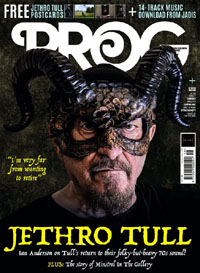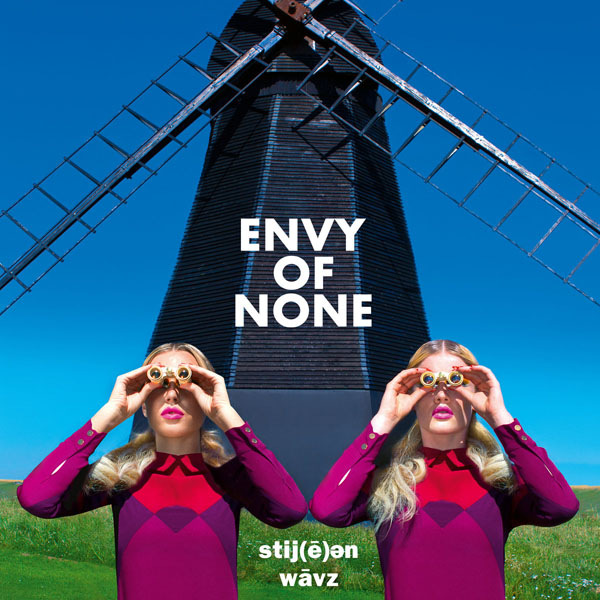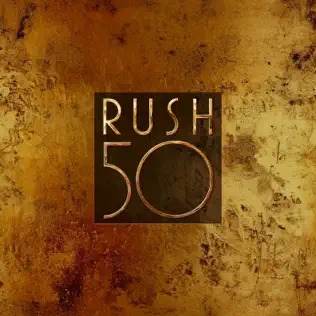Andy (And Alex) In The Underworld with Envy of None
By Dave Everley; album reviews by James McNair & Dave Everley, PROG Issue #158, March 2025, transcribed by John Patuto

Alex Lifeson's post-Rush band Envy Of None make a very welcome return with their second album, Stygian Wavz, which takes its title from the River Styx in Greek mythology. Alex Lifeson and bassist Andy Curran invite Prog for a dip in their dark progressive-pop waters, where they discuss finding their feet, welcoming the muse and embracing a set of very different musical challenges.
Alex Lifeson's eyes are sparkling with pride and they're matched by a broadening smile so warm that it could melt the snow that's piled up outside of his home studio in the Canadian city of Toronto from where he speaks. Behind him hanging on the wall are just a small selection of the guitars with which he's made his name - there's a Gibson ES-355 associated with Rush's earliest days, a few Gibson Les Pauls and some Fender Telecasters among others - and in his hand is a steaming mug of coffee that befits this mid-morning hour. Right now, he's recalling the tipping point when Envy Of None - the electronica- and industrial influenced outfit formed with vocalist Maiah Wynne, former Coney Hatch bassist Andy Curran and second guitarist and multi-instrumentalist Alfio Annibalini - went from being a project to a band.
"The first time I listened to the whole of Stygian Wavz mastered, I thought, 'Goddammit, we're a band! This is a good band!'" he enthuses. "The [eponymous] first album was a project to me, but with Stygian Wavz, there's something about it. I guess it was the way we worked - we were more connected and I was happy with that."
For Andy Curran, who joins Lifeson via video link from Los Angeles at the ungodly hour of 7.30am PST, the confirmation of Envy Of None's change in working status came through a moment of levity.
"I secretly asked graphic artist Brian Walsby to draw all four members of the band as Gerry Anderson's Thunderbirds," he says with a chuckle. "I showed them this poster that said, 'Envy Of None Are Go!' Alex said, 'That should be the album cover!' and that was when I knew we were a band."
And should anybody still be in any doubt over the sincerity of their intent, Lifeson stresses that he's experiencing the same level of excitement over the release of Stygian Wavz as he has at any point since Rush released their selftitled debut album back in 1974.
"We're so excited about the album," he enthuses. "It's been a year and a half of our lives working on this record from the spring of 2023."
"And you still get that thrill hearing it on the radio," adds Curran.
It's difficult not to share their fervour; Stygian Wavz is infused with a sense of urgency, immediacy and accessibility that builds on their debut to take their music several strides forward with a confidence that oozes from its pores. As heralded by the singles that preceded its release - the filthy electro groove of Not Dead Yet and Under The Stars's textured poprock - the album finds Envy Of None painting from a broader palette with bolder brush strokes.
As Lifeson tells it, there was never any doubt that a second album would definitely happen.
 "We started working on this record maybe a half hour after we released the first album," he says with a laugh. "We had bits and pieces that were floating around from the first record. We started there and more material started to flow in and that was the seed point of the project. It really was a concerted effort on all our parts and we were all really excited with doing a second record and we kind of dove into it."
"We started working on this record maybe a half hour after we released the first album," he says with a laugh. "We had bits and pieces that were floating around from the first record. We started there and more material started to flow in and that was the seed point of the project. It really was a concerted effort on all our parts and we were all really excited with doing a second record and we kind of dove into it."
Following a steady exchange of ideas and working up bed tracks, Envy Of None properly hit their stride in the summer of 2024. Indeed, such was the level of commitment between the bandmembers that they jettisoned their original modus operandi of layering up the music via file sharing and remote recording to actually convening in a studio to work faceto- face. They lasted just seven days before reverting to their previous working methods.
"When I look back at that, I think we were far more efficient working individually in our studios," reasons Curran. "Maiah didn't have three guys pumping opinions into her while she was recording. That's what we enjoy about working individually - there's no one piping in our ears. I got the impression she was much happier working on her own."
Lifeson nods in agreement saying, "I think there's a vibe when you're in the room together, but as Andy says, it's difficult not to get distracted by comments and activity in the room; everybody gets excited and has an idea of what to throw in the pot. I totally get that - with Rush we were all superactive in all our parts, but I find that when I'm working at home in this great little studio of mine, I'm not distracted and I dive into it. And if I don't like it then I can delete it and start over again. I get into a flow and it's more efficient and I work quicker. I prefer to work independently. I think we're all skilled enough to collectively work and submit our parts and everybody gets it and everybody feels it. We keep building a pyramid by sending back files."
Lifeson reasons that remote-working frees up singer Maiah Wynne to experiment with any number of vocal melodies and harmonies that inspire the guitarist to come up with new ideas to send back, which in turn inspire her further. Think of it as musical tennis.
"Often I'll do a scratch guitar on something that Andy and Alf would send, and I'd send that off to Maiah," says Lifeson. "She would do a basic scratch vocal and that would come back to me. I'd get so much information from her vocal and, because she's a fucking genius, I get inspired to go to other places with my guitar parts. This snowball effect is brilliant with all these ideas developing and barrelling forward."
Warming to the subject, Lifeson praises the singer's contribution, role and development within the band.
"Maiah is the centre of Envy Of None; we surround her," explains Lifeson. "Her vocal arrangements are the centre of what it is. It's important not to step in it. I'm serving the song; that's who I am and who I want to be. It's different for me now and I embrace and absolutely adore that. Musically, she's my muse. She thinks about music very similarly to the way I do. We're really connected despite the 50-yearor- so age difference and we really do walk the same path. And when we trade back and forth, quite often the result is a dance that we do between the guitar parts and the vocal parts.
"From the personal end, I see a lot of growth in Maiah. We started working with her when she was 19 so we've had a really cool era with her as she's grown as a vocalist and as a person as well."
 The cynical view of supergroups or side-projects featuring an established musician is that they serve as an ego massage or a vehicle for music that was laughed out of the studio during the course of the day job. Although they've just released the career-spanning Rush 50, Alex Lifeson is no longer bound by his former band - the only group he's ever played in bar a few guest slots here and there - which offers him a whole new musical route to explore. Crucially, Envy Of None make absolutely no reference to either Rush or Coney Hatch. This is music that's made on its own terms to stand on its own two legs. It's all the better for it and none of the band would have it any other way.
The cynical view of supergroups or side-projects featuring an established musician is that they serve as an ego massage or a vehicle for music that was laughed out of the studio during the course of the day job. Although they've just released the career-spanning Rush 50, Alex Lifeson is no longer bound by his former band - the only group he's ever played in bar a few guest slots here and there - which offers him a whole new musical route to explore. Crucially, Envy Of None make absolutely no reference to either Rush or Coney Hatch. This is music that's made on its own terms to stand on its own two legs. It's all the better for it and none of the band would have it any other way.
"I can only speak for myself, but I'm super-proud of my past and everything that Rush accomplished," states the guitarist. "I think we wrote some great songs and we wrote some crazy songs and maybe a couple of duffers, but it's what I did and I've sort of moved on. I'm so happy and excited with my life now as one of the folks in Envy Of None. It's a whole new thing for me."
Indeed. While Stygian Wavz has increased the number of guitar solos in comparison to its predecessor, Alex Lifeson's initial trepidation in how to approach them within the framework of Envy Of None soon turned into an altogether more pleasurable experience.
"I didn't want it to be too Alex Lifeson-like," he says. "I had a lot of fun because solos, for me, have never been this flashy thing and trying to be a show-off. Solos are an integral part of the song that bring home a point to the song, and I like to think that the solos that I do connect very closely with what the song is about. It's one more part of the main body of the song and it doesn't stand out as this singular moment. I want it to feel that it's in service to the song."
So, was Lifeson challenging himself?
"Absolutely! I am challenging myself," he says. "I have to be more delicate at times and I have to step back and acknowledge and celebrate the amazing vocalist that's in this band."
"In the early stages of the songwriting when we're throwing around ideas, I watch the song develop," elaborates Curran. "The solos that Alex has added usually come after Maiah's scratch vocals where it feels like it needs to go somewhere. The solo punctuates the song and it's right there. I don't ever get the impression that Alex has popped something in so that he could shred or show off. It's always about the song and taking it to a plateau level."
This, says Curran, is all about the evolving chemistry within the band: "The courtesy that we show each other and the amount of rope we give each other is great. I've been in bands before where there's been a lot of turmoil and turf wars and there's nothing bad in Envy Of None."
Surely, with the band sparking off of each and two albums and an EP under their collective belt, Envy Of None must be itching to play live? Or is this too much to hope for?
"We would love to play live," Lifeson replies. "It would really be a great show with the right lighting and adding some musicians for a live presentation. Playing these songs live with Maiah as the focus with the production and the sound quality that we could achieve would be really fabulous."
But caveats apply.
"Everybody is busy, everybody's got stuff and it's definitely difficult for me to plan something like that. I wouldn't write the idea off and it's a possibility if all things can align."
So, while live gigs are a possibility at best, one thing that can be counted on is another album. Right?
"Oh, I think we have a few ideas left over from the last one," says Lifeson with a broad grin, his eyes sparkling once more.
Stygian Wavz is out on March 14 via Kscope. See envyofnone.com for more information.
Envy Of None: Stygian Wavz (KSCOPE)
Second album from Alex Lifeson's dark prog-pop project.

By James McNair
It's not about that guy from Rush anymore; not that there's anything wrong with him!" Alex Lifeson says about Envy Of None's second album. The second album from the Canadian group initially put together by former Coney Hatch bassist Andy Curran and producer/keyboardist Alfio Annibali before being joined by star-signing Lifeson and singer Maiah Wynne certainly cements their unique sound, but dig deep and links to the ex-Rush guitarist's past exist.
'Stygian', meaning 'very dark', has etymological roots in the River Styx from Greek mythology, as mentioned by Rush in 1975's By-Tor And The Snow Dog. Fifty years on, the syntactically maverick title Stygian Wavz refers to what Lifeson calls "turbulence at the gates of Hell". Precisely what he's flagging up is unclear, but the phrase works well as a descriptor for the dystopia that's seemingly unfolding.
As on their 2022 debut album, Wynne is crucial to Envy Of None's appeal. Her sultry, unflustered vocals, sometimes as much breath as note, give a slightly gothic tinge to the electronic prog-pop/industrial rock material on offer. Nine Inch Nails and Garbage once again seem to be reference points, but the songwriting is stronger this time. It's evident that, like the foursome have a stronger sense of each bandmember's strengths and how best to marry them.
Where driving, rather funky opener Not Dead Yet raises a middle finger to those in the music industry dismissive of artists in their twilight years, the album's penultimate song, The End, seems less defiant, wholly acceptant of mortality. Lyrically, there's also something Neil Peart-like about the latter's altruistic message: 'What you get is what you give' sings Wynne over dark chords with gravitas.
It's clear from Stygian Wavz that Envy Of None aren't just a side-project. Witness the surety of the chewy, analogue synth and skanking guitar textures on Raindrops, or the powerful, driving The Story, wherein Wynne's airy vocals seduce again. Alex Lifeson being Alex Lifeson, moreover, it would be remiss not to report that he plays at least four - maybe four and a half - actual guitar solos on Stygian Wavz. The one on dark ballad Under The Stars is particularly gratifying. How great to hear those colours in his palette being used once again.
Now that Envy Of None look like they're here for keeps, it'll be interesting to see what bearing that has on Lifeson's former Rush bandmate, Geddy Lee. Will he, too, be galvanised into joining or forming a new band, teaming with old friends or newer, younger talents? It's certainly done Lifeson a power of good.
RUSH: R50 (MERCURY/UME)
Not so much a greatest hits as a celebration of an unmatched career.

By Dave Everley
For a band built around musical precision, timing wasn't always Rush's strong point. In 2015, they played their farewell R40 Live Tour, despite it actually being 41 years since their debut album. Now comes this 50th-anniversary celebration, similarly a year overdue. Better late than never.
R50 is a luxurious celebration of the venerated Canadian trio's career. It's available in a range of box set formats, from the basic four-CD-plus-104-page hardback book version (priced at around £80) to the superfan-serving Backstage Exclusive Super Deluxe Edition (available for just over £300). There's inevitably been consternation at the elevated prices in the corner of the internet where Rush fans lurk, but caveat emptor applies: no one is being forced to buy it.
What about the music? R50 does a great job of charting the band's journey from nerdy The Who and Led Zeppelin freaks to elder statesmen grudgingly accepted by the cultural gatekeepers who once derided them, cherry-picking at least one song from each studio and live album. Fans can fulminate over the merits of the tracklisting - "Where the hell is The Fountain Of Lamenth?!" - but it hits all the right beats.
The big draw musically is the scattering of rare and unreleased songs. Their debut single, an enthusiastic but farfrom- classic cover of Buddy Holly's Not Fade Away, and its B-side, You Can't Fight It, resurface here for the first time since they were originally released in 1973. More intriguing are the rough-arsed cover of Larry Williams's Bad Boy and the Rush original Garden Road, both recorded live in Cleveland in 1974 and never officially released before on any format. Neither are jaw-dropping, but they're fascinating as historical documents, though it's a shame they didn't exhume the similarly lost-to-time Fancy Dancer, too.
The real wallop comes at the other end of the journey. R50 closes with the moment that brought the curtain down on their career: a medley of What You're Doing and Working Man, recorded at their final show, at the Los Angeles Forum on August 1, 2015. Geddy Lee's voice is all over the place, but it doesn't matter - the emotion of it all is inescapable.
Of course, there's an unavoidable poignancy to this delayed milestone. Rush never made their 50th anniversary, never mind their 51st. The farewell tour was just that - it seemed unlikely that Neil Peart was ever going to change his mind. His death in 2020 put the matter beyond doubt. Rush still exists in name, but Lee and Alex Lifeson have been clear about not wanting to bring it back as a working proposition, and nor should they. Punctuality aside, R50 is a fitting testament to the brilliant band they were.